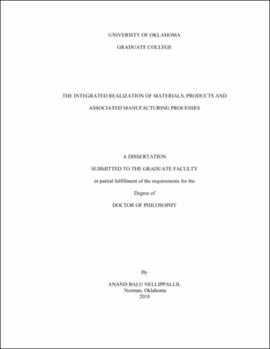| dc.description.abstract | Problem: A materials design revolution is underway in the recent past where the focus is to design (not select) the material microstructure and processing paths to achieve multiple property or performance requirements that are often in conflict. The advancements in computer simulations have resulted in the speeding up of the process of discovering new materials and has paved way for rapid assessment of process-structure-property-performance relationships of materials, products, and processes. This has led to the simulation-based design of material microstructure (microstructure-mediated design) to satisfy multiple property or performance goals of the product/process/system thereby replacing the classical material design and selection approaches. The foundational premise for this dissertation is that systems-based materials design techniques offer the potential for tailoring materials, their processing paths and the end products that employ these materials in an integrated fashion for challenging applications to satisfy conflicting product and process level property and performance requirements. The primary goal in this dissertation is to establish some of the scientific foundations and tools that are needed for the integrated realization of materials, products and manufacturing processes using simulation models that are typically incomplete, inaccurate and not of equal fidelity by managing the uncertainty associated. Accordingly, the interest in this dissertation lies in establishing a systems-based design architecture that includes system-level synthesis methods and tools that are required for the integrated design of complex materials, products and associated manufacturing processes starting from the end requirements. Hence the primary research question: What are the theoretical, mathematical and computational foundations needed for establishing a comprehensive systems-based design architecture to realize the integrated design of the product, its environment, manufacturing processes and material as a system? Major challenges to be addressed here are: a) integration of models (material, process and product) to establish processing-structure-property-performance relationships, b) goal-oriented inverse design of material microstructures and processing paths to meet multiple conflicting performance/property requirements, c) robust concept exploration by managing uncertainty across process chains and d) systematic, domain-independent, modular, reconfigurable, reusable, computer interpretable, archivable, and multi-objective decision support in the early stages of design to different users.
Approach: In order to address these challenges, the primary hypothesis in this dissertation is to establish the theoretical, mathematical and computational foundations for: 1) forward material, product and process workflows through systematic identification and integration of models to define the processing-structure-property-performance relationships; 2) a concept exploration framework supporting systematic formulation of design problems facilitating robust design exploration by bringing together robust design principles and multi-objective decision making protocols;
3) a generic, goal-oriented, inverse decision-based design method that uses 1) and 2) to facilitate the systems-based inverse design of material microstructures and processing paths to meet multiple product level performance/property requirements, thereby generating the problem-specific inverse decision workflow; and 4) integrating the workflows with a knowledge-based platform anchored in modeling decision-related knowledge facilitating capture, execution and reuse of the knowledge associated with 1), 2) and 3). This establishes a comprehensive systems-based design architecture to realize the integrated design of the product, its environment, manufacturing processes and material as a system.
Validation: The systems-based design architecture for the integrated realization of materials, products and associated manufacturing processes is validated using the validation-square approach that consists of theoretical and empirical validation. Empirical validation of the design architecture is carried out using an industry driven problem namely the ‘Integrated Design of Steel (Material), Manufacturing Processes (Rolling and Cooling) and Hot Rolled Rods (Product) for Automotive Gears’. Specific sub-problems are formulated within this problem domain to address various research questions identified in this dissertation.
Contributions: The contributions from the dissertation are categorized into new knowledge in four research domains: a) systematic model integration (vertical and horizontal) for integrated material and product workflows, b) goal-oriented, inverse decision support, c) robust concept exploration of process chains with multiple conflicting goals and d) knowledge-based decision support for rapid and robust design exploration in simulation-based integrated material, product and process design.
The creation of new knowledge in this dissertation is associated with the development of a systems-based design architecture involving systematic function-based approach of formulating forward material workflows, a concept exploration framework for systematic design exploration, an inverse decision-based design method, and robust design metrics, all integrated with a knowledge-based platform for decision support. The theoretical, mathematical and computational foundations for the design architecture are proposed in this dissertation to facilitate rapid and robust exploration of the design and solution spaces to identify material microstructures and processing paths that satisfy conflicting property and performance for complex materials, products and processes by managing uncertainty. | en_US |
